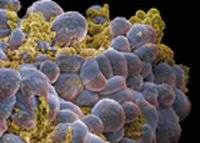Scientists discover five new genome regions that increase breast cancer risk

(PhysOrg.com) -- Scientists have found five new regions of the genome that increase a woman's risk of developing breast cancer by between 6 and 16 per cent, according to a study published in the journal 'Nature Genetics'.
The results of the study, funded by Cancer Research UK and the Wellcome Trust and carried out by scientists at the University of Cambridge and the Institute of Cancer Research (ICR), take the total number of common 'low-risk' genetic sites associated with breast cancer to 18.
The increased risk conferred by these genetic variants is small, but as more of these 'low-risk' sites are found, scientists believe it may be possible to create tests for a combination of them that together significantly increase risk.
This could help doctors make decisions about prevention, diagnosis and treatment for women who are more likely to get breast cancer.
One of the sites identified contains a gene called CDK2NA, which regulates the process of cell division and is altered in the DNA of many tumours. This gene has also been linked to increased risk of a type of skin cancer called melanoma.
Interestingly, most of the regions found appear to predispose predominantly towards oestrogen-receptor-positive breast cancers. The cells for these cancers have receptors on their surface that the female sex hormone oestrogen binds to, stimulating growth of the tumour. Such cancers respond well to hormone therapy.
This could open new avenues for research into the use of drugs such as tamoxifen, which can reduce the risk of this form of breast cancer.
The scientists scanned the entire genetic code of over 4000 women with breast cancer and a family history of the disease for genetic variations that cropped up more often compared to healthy women. They then tested the most promising regions in over 12 000 women with breast cancer and 12 000 women without breast cancer, in an international collaboration that included data generated by the Wellcome Trust Case Control Consortium.
Study author Professor Nazneen Rahman, Professor of Human Genetics at the ICR, said: "Our results now take the total number of gene regions linked to the risk of breast cancer to 18, but we still don't know which genes are causing this increased risk. Identifying the underlying genes and mechanisms behind breast cancer development is essential to increasing our understanding of the disease and ultimately finding new treatments."
Lead author Professor Doug Easton, from the University of Cambridge, said: "While each of these sites has a small impact on breast cancer risk, by finding more of these genes we may be able to develop a test that can predict more reliably a woman's risk of developing breast cancer."
Breast cancer is the most common cancer in the UK, with more than 45 500 new cases diagnosed each year.
Lifestyle factors play an important role in influencing the risk of breast cancer, but inherited factors are also important in determining an individual woman's risk of the disease.
Dr Helen George, head of science information at Cancer Research UK, said: "This is by far the largest study of its kind to explore the common genetic variations that contribute to breast cancer risk. This research takes us a step closer to developing a powerful genetic test for the disease. Such a test could help doctors identify women who have an increased breast cancer risk so that they can make informed decisions about how to take steps to reduce their chance of developing the disease."
More information: Turnbull C et al. Genome-wide association study identifies five new breast cancer susceptibility loci. Nat Genet 2010 [epub ahead of print]. www.nature.com/ng/journal/vaop … rent/abs/ng.586.html















